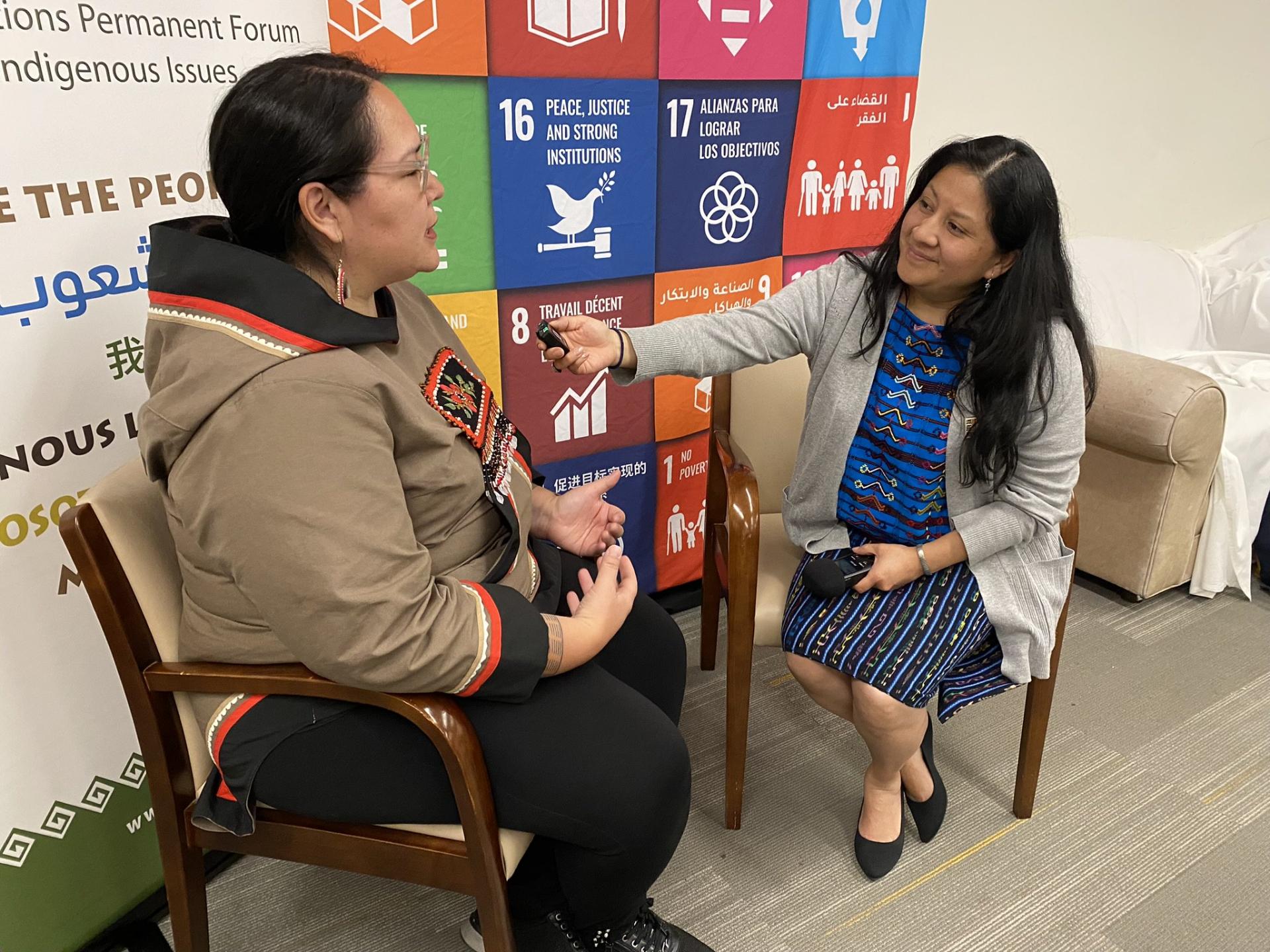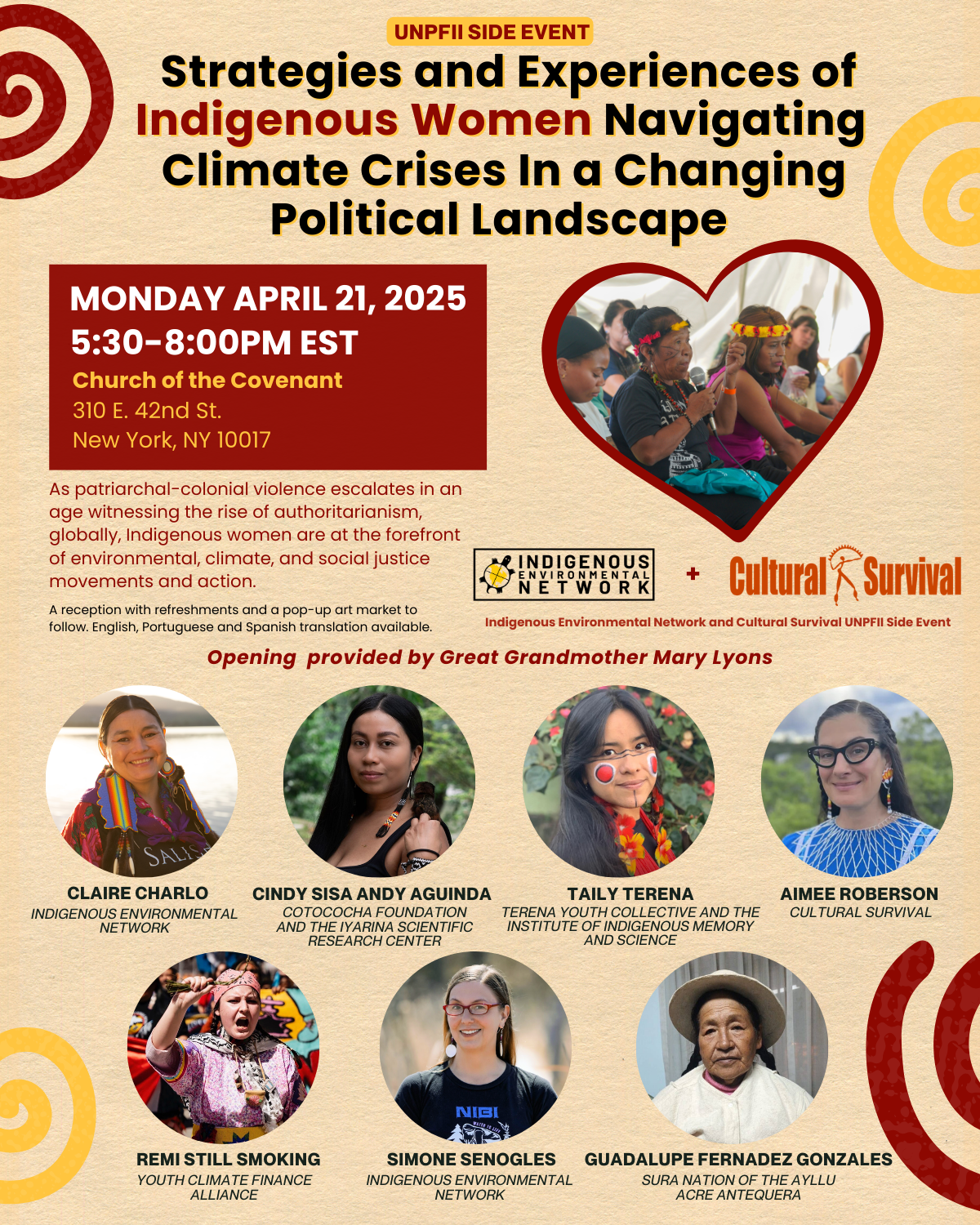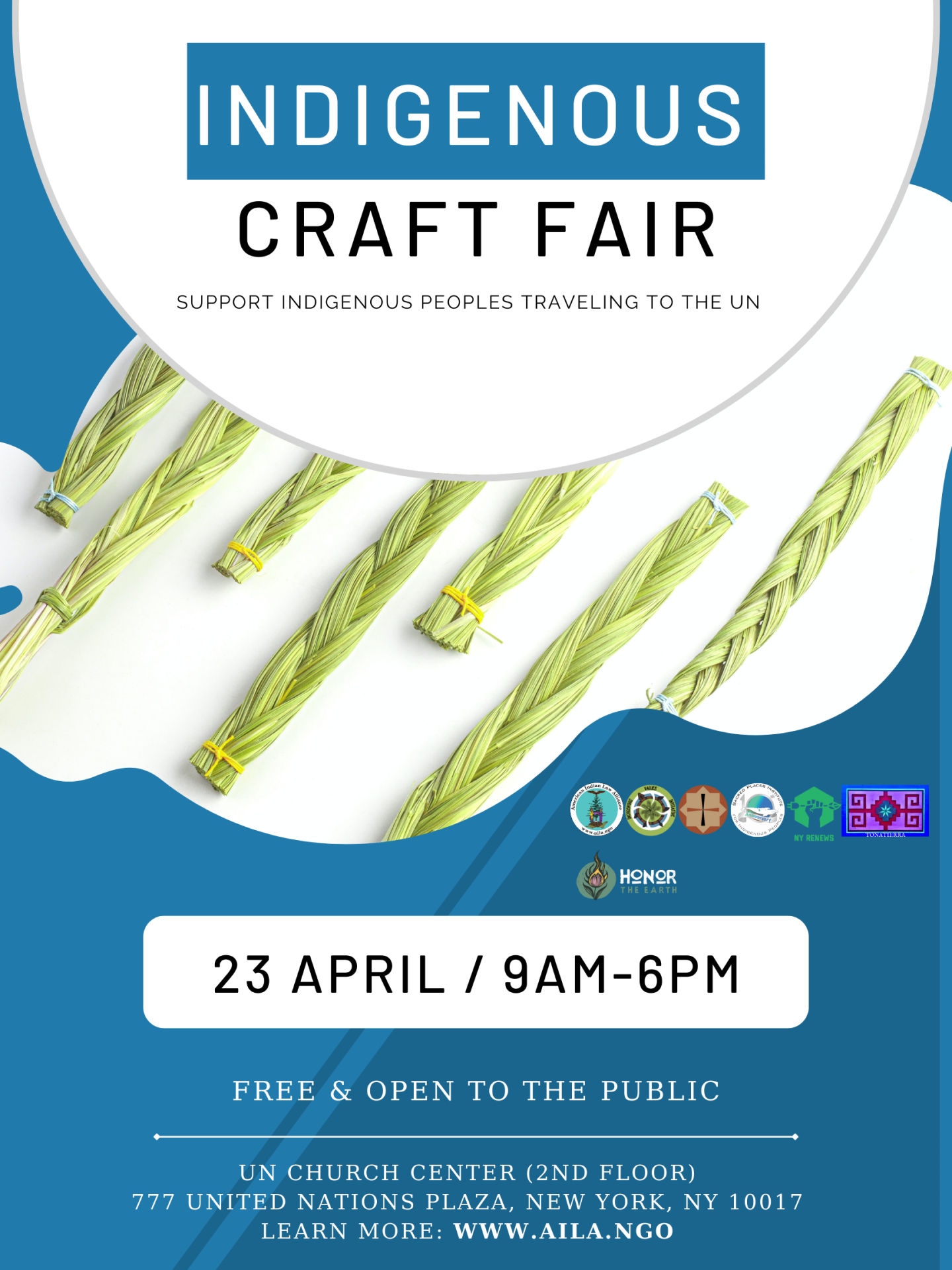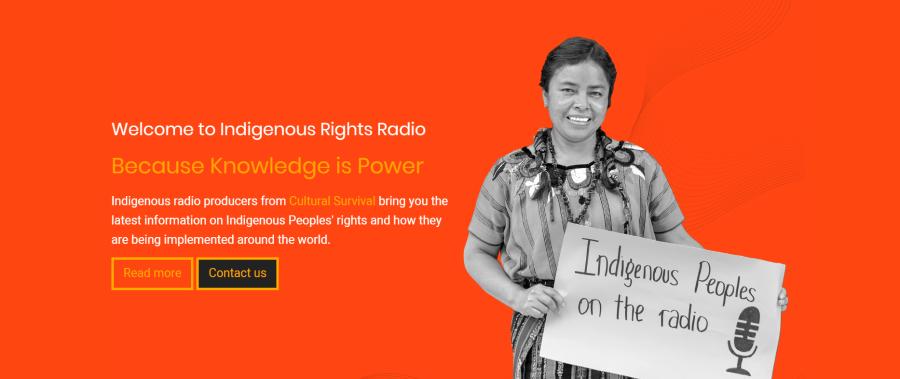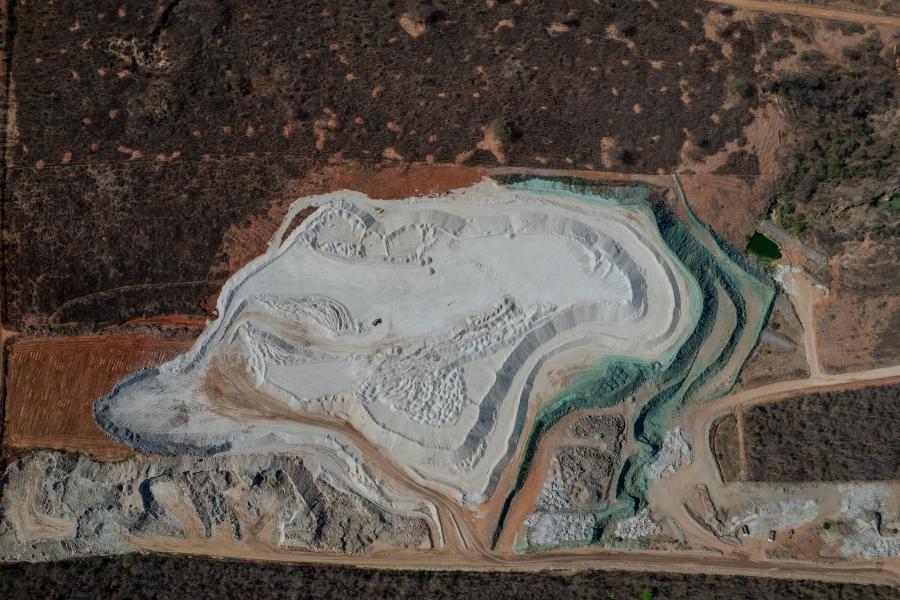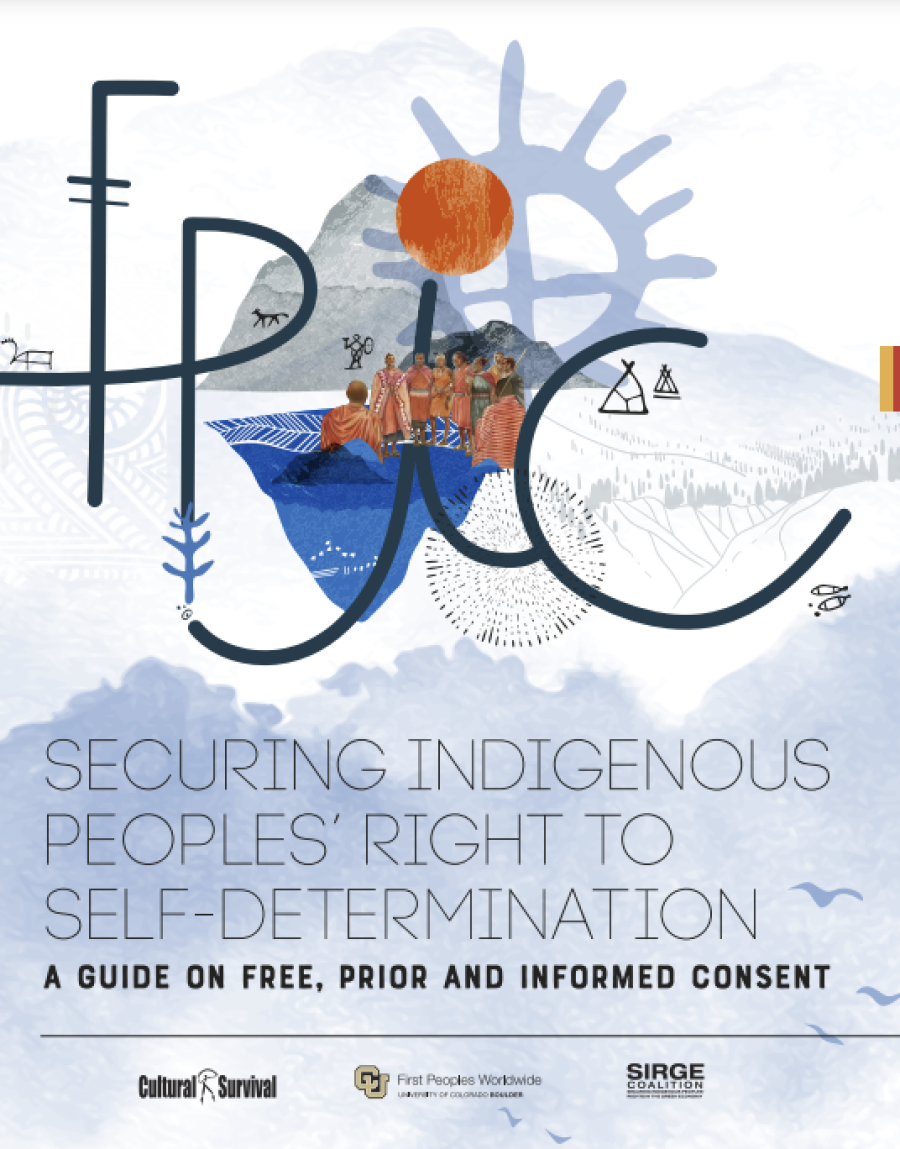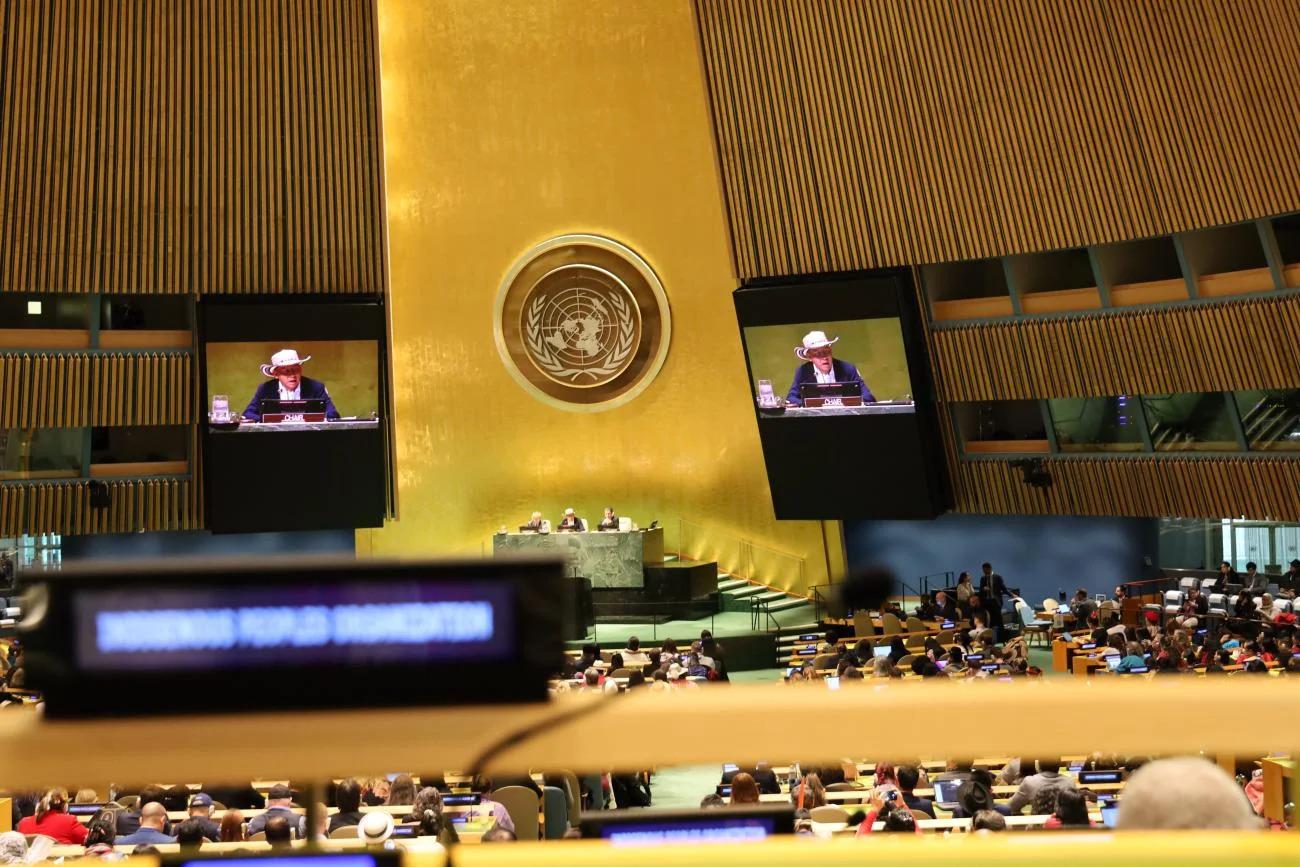
On April 21-May 5, 2025, the 24th session of the United Nations Permanent Forum on Indigenous Issues (UNPFII) will take place at the UN Headquarters in New York. This year’s session theme will focus on "Implementing the United Nations Declaration on the Rights of Indigenous Peoples within United Nations Member States and the United Nations system, including identifying good practices and addressing challenges.”
After decades of Indigenous leaders pushing for inclusion and representation at the United Nations, on July 28, 2000, the UNPFII was established as a high-level advisory body to the UN Economic and Social Council by resolution 2000/22. Since 2002, the UNPFII has been meeting annually.
The UNPFII can be utilized by Indigenous Peoples to raise awareness, bring policy change to other UN bodies, and influence how Indigenous rights are implemented at the local and national levels. Over the past 24 years, the UNPFII has coordinated and commissioned over 65 studies and reports and 60 publications. Members of the Forum have worked on drafting policies for UN agencies and have made recommendations to other UN bodies.
Some of the greatest achievements over the past two decades have been the networking and alliances built among Indigenous delegates and representatives from all over the world. The relationships, partnerships, and friendships built are core to the global Indigenous rights movement. Aside from the official talks, interventions, panels, official side events, and parallel events, what really also needs to be elevated are the side conversations in the hallways between delegations, UN agencies, funders, and State representatives. This is where true change happens.
1. Join the conversation!
What are the pressing issues affecting your Indigenous community?
Create a short video (up to 2 minutes) and post it on Instagram, Threads, Bluesky, X/Twitter, and Facebook using #UNPFII24 #WeAreIndigenous #Proud2BIndigenous.
Share your photos from this year's and the past UNPFIIs using the same hashtags.
2. Watch the Livestream of the UNPFII.
Opening ceremony of the Forum will be streamed at webtv.un.org.
Monday, April 21, 2025 11:00am.
Watch the recording here.
3. Attend a UNPFII side event.
The full list of side events are posted here for delegates who will be attending the UNPFII.
Join Cultural Survival at these events below:
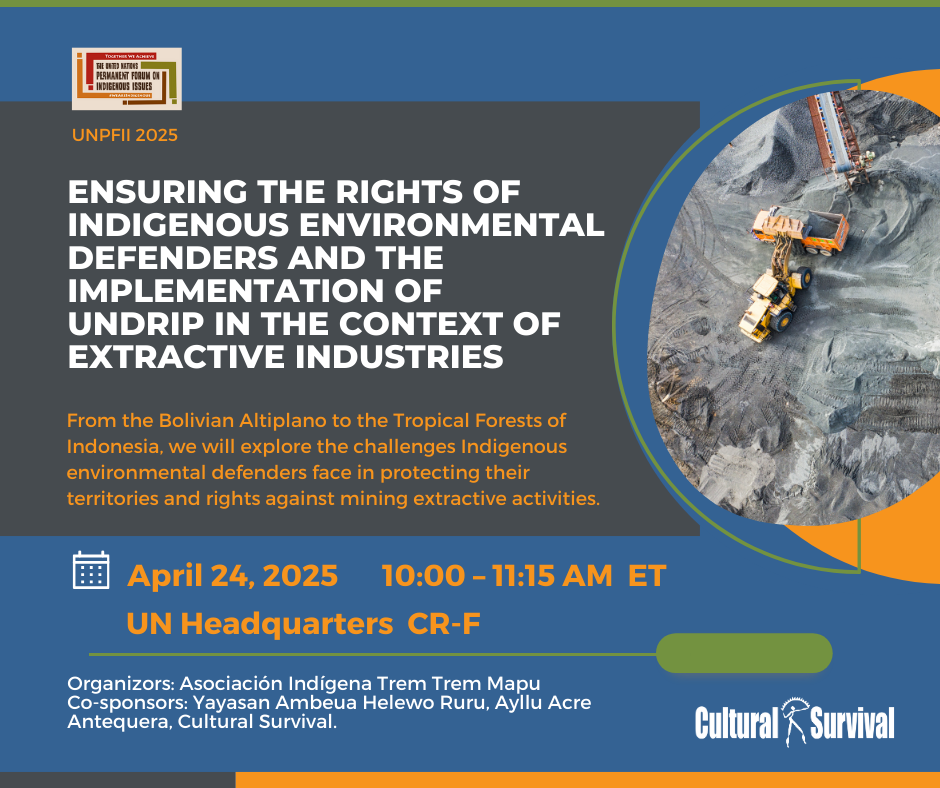
Thursday, April 24, 2025 10:00 – 11:15 ET
UN Headquarters, NYC CR-F
Ensuring the Rights of Indigenous Environmental Defenders and the Implementation of UNDRIP in the Context of Extractive Industries
This side event will bring together Indigenous leaders, human rights experts, and civil society representatives to analyze the implementation of UNDRIP in different contexts and discuss effective strategies to ensure free, prior, and informed consent (FPIC). We will also address the risks faced by environmental defenders and the urgent need to strengthen protection mechanisms against threats and criminalization. From the Bolivian Altiplano to the Tropical Forests of Indonesia, we will explore the challenges Indigenous environmental defenders face in protecting their territories and rights against mining extractive activities.
Speakers:
- Guadalupe Fernández, Ayllu Acre Antequera (Bolivia)
- Pastor Carvajal (Bolivia)
- Novenia Ambeua, Helewo Ruru Fundation (Indonesia)
- Maria Jose Andrade Cerda (Ecuador)
- Moderator: Mariana Kiimi Ortiz
Languages: English, Spanish
Organizors: Asociación Indígena Trem Trem Mapu Co-sponsors: Yayasan Ambeua Helewo Ruru, Ayllu Acre Antequera, Cultural Survival.
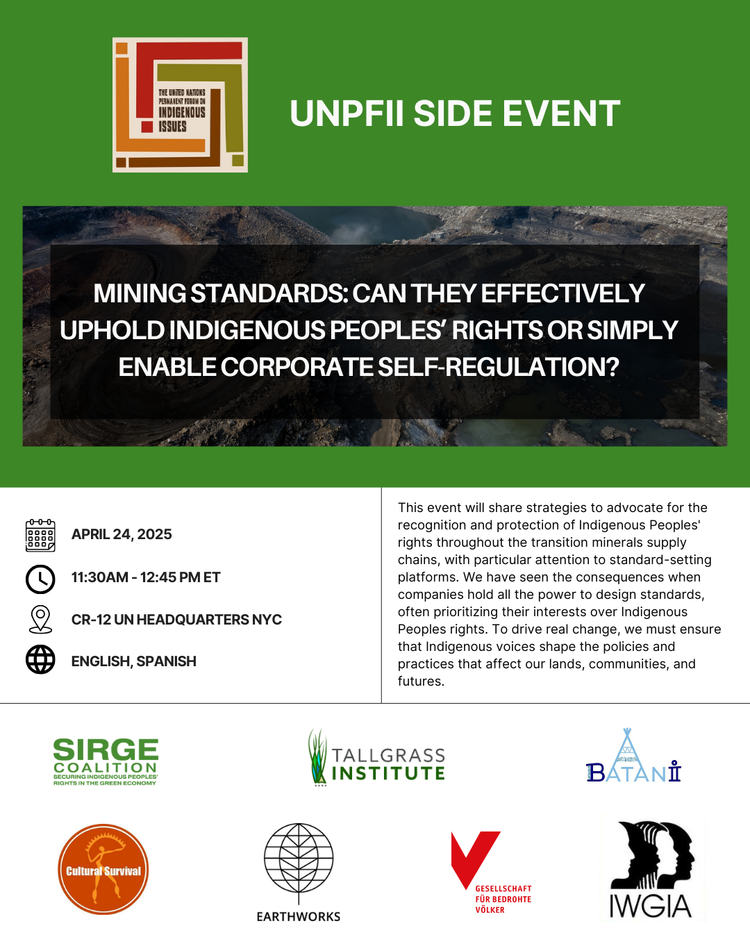
Thursday, April 24, 2025 11:30 am-12:45 pm
UN Headquarters NYC CR-12
Mining Standards: Can They Effectively Uphold Indigenous Peoples’ Rights or Simply Enable Corporate Self-Regulation?
Over the past few years, several mining standards have been developed to guide responsible practices in transition minerals supply chains, impacting Indigenous Peoples' rights and livelihoods. However, many of these standards still fall short in ensuring the full and equitable participation of Indigenous Peoples, providing access to critical information, and guaranteeing the genuine implementation of Indigenous Peoples' rights, including Free, Prior, and Informed Consent.
Mining companies and investors often tout voluntary standards as a means of ensuring responsible practices, but do these frameworks truly uphold Indigenous Peoples' rights? This panel will critically examine the effectiveness of mining standards in protecting Indigenous Peoples' rights, lands, territories and livelihoods. Indigenous leaders and experts will discuss whether these standards serve as meaningful accountability mechanisms or if they merely provide companies with a tool for corporate self-regulation. The discussion will also explore the risks of mining standards replacing legislation and Indigenous self-determination in decision-making processes.
Together we will share strategies to advocate for the recognition and protection of Indigenous Peoples' rights throughout the transition minerals supply chains, with particular attention to standard-setting platforms. We have seen the consequences when companies hold all the power to design standards, often prioritizing their interests over Indigenous Peoples' rights. To drive real change, we must ensure that Indigenous voices shape the policies and practices that affect our lands, communities, and futures.
Speakers:
- Galina Angarova, SIRGE Coalition
- Kate Finn, Tallgrass Institute
- Emil Siren Gualinga
- Chelsea Hodgkins, Public Citizen
- Moderator: Bryan Bixcul, SIRGE Coalition
Languages: English, Spanish
Co-sponsors: SIRGE Coalition, Batani Foundation, Earthworks, Tallgrass Institute, STP, Cultural Survival, IWGIA.
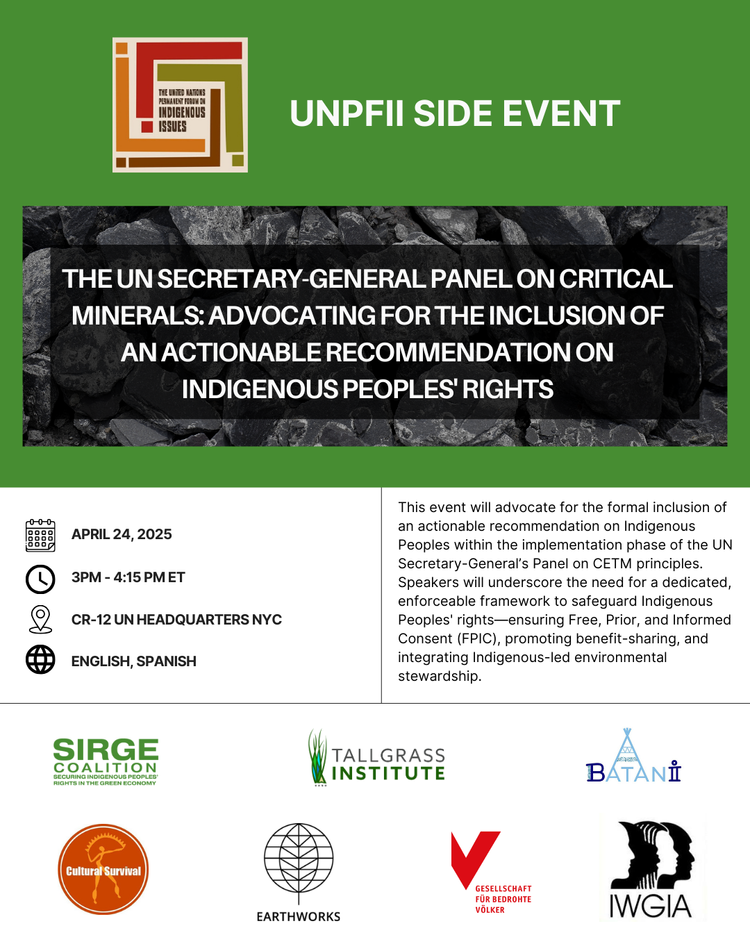
Thursday, April 24, 2025 3:00-4:15 pm
UN Headquarters NYC CR-12
The UN Secretary-General Panel on Critical Minerals: Advocating for the Inclusion of an Actionable Recommendation on Indigenous Peoples' Rights
The global demand for transition minerals is accelerating as countries shift to renewable energy. Yet, Indigenous Peoples—who steward much of the land where these minerals are found—continue to face exclusion, rights violations, and environmental degradation. Indigenous Peoples call for the creation of an Integrated Framework to ensure the protection of their rights in critical energy transition mineral (CETM) projects.
This event will advocate for the formal inclusion of an actionable recommendation on Indigenous Peoples within the implementation phase of the UN Secretary-General’s Panel on CETM principles. Speakers will underscore the need for a dedicated, enforceable framework to safeguard Indigenous Peoples' rights—ensuring Free, Prior, and Informed Consent (FPIC), promoting benefit-sharing, and integrating Indigenous-led environmental stewardship.
The discussion will highlight concrete steps that governments, financial institutions, and companies must take to embed justice, equity, and Indigenous leadership in the energy transition. It will also serve as a key platform to share the outcome document from the Indigenous Peoples' Summit on Just Transition.
Speakers:
- Galina Angarova, Executive Director, SIRGE Coalition
- Dario Mejia Montalvo - Member of the UN Permanent Forum on Indigenous Issues
- Sara Olsvig - Inuit Circumpolar Council
- Novenia Ambeua
Languages: English, Spanish
Organizer: SIRGE Coalition, Cultural Survival, Batani Foundation, Tallgrass Institute, Earthworks, Society for Threatened Peoples, IWGIA.
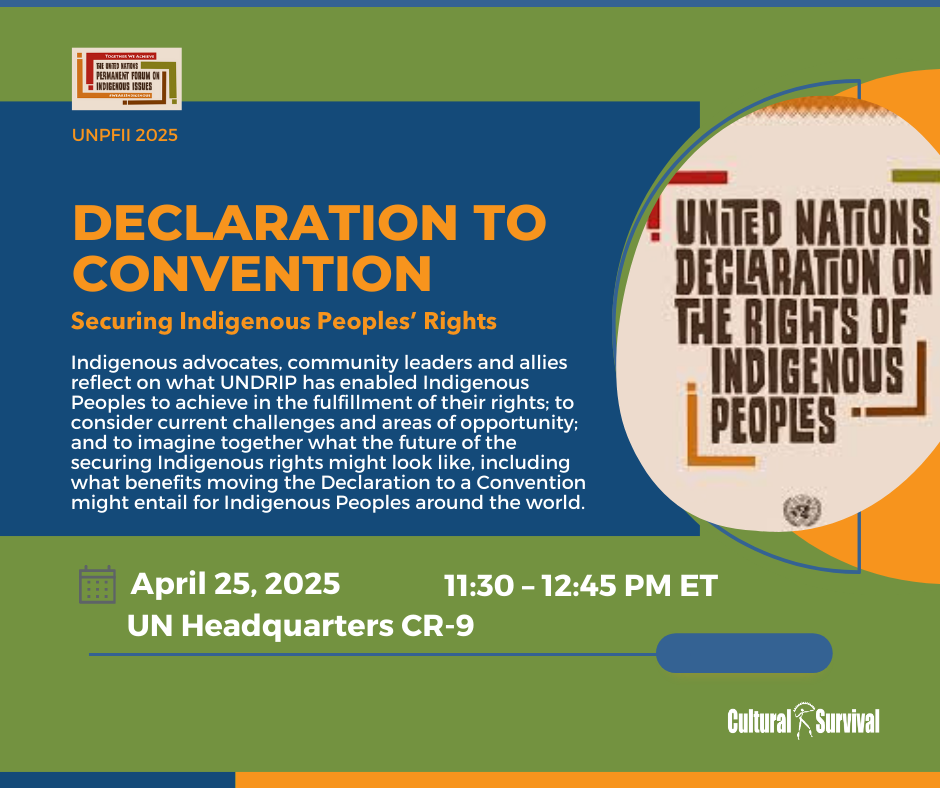
Friday, April 25, 2025 11:30 – 12:45pm
UN Headquarters, NYC CR-9
Declaration to Convention - Securing Indigenous Peoples’ Rights
The United Nations Declaration on the Rights of Indigenous Peoples (UNDRIP), adopted on September 13th, 2007, marked an unparalleled milestone in the fight for the protection of Indigenous Peoples' rights. Since its adoption, 144 countries have endorsed the Declaration. However, Indigenous communities worldwide are acutely aware that the struggle to defend their rights is far from over, especially with emerging challenges such as the expansion of transitional mineral mining on Indigenous lands, land grabbing, environmental degradation, and the ongoing threat of cultural assimilation. These new threats, alongside the lack of full implementation of UNDRIP in many countries, highlight that the Declaration, while significant, is only a first step in the broader effort to ensure justice and self-determination for Indigenous peoples. In this panel discussion, we will bring together Indigenous advocates, community leaders and allies to reflect on what UNDRIP has enabled Indigenous Peoples to achieve in the fulfillment of their rights; to consider current challenges and areas of opportunity; and to imagine together what the future of the securing Indigenous rights might look like, including what benefits moving the Declaration to a Convention might entail for Indigenous Peoples around the world.
Languages: English, Spanish
Organizers: Cultural Survival and Nepal Tamang Women Ghedung
4. Follow Discussions from the Indigenous Media Zone.
The Secretariat of the Permanent Forum (SPFII) and the Department of Global Communications (DGC), in partnership with Cultural Survival, is organizing an Indigenous Media Zone during the 24th session of the Permanent Forum in 2025. This will allow Indigenous media, journalists and platforms an opportunity to report on the session through Indigenous worldviews, perspectives and languages and organize media events around the theme of the session - “Enhancing Indigenous Peoples’ right to self-determination in the context of the United Nations Declaration on the Rights of Indigenous Peoples: emphasizing the voices of Indigenous youth”. Non-indigenous media are also welcome to join the Indigenous Media Zone. Further, in line with the International Decade on Indigenous Languages, the Indigenous Media Zone will aim to encourage the participation of Indigenous media practitioners in a wide variety of Indigenous languages from different regions. Several panels and interviews will be livestreamed on facebook.com/culturalsurvival.
A preliminary schedule is available here.
The Indigenous Media Zone will be located in the UN Correspondents Association Room (3rd floor, Secretariat building, S-310) from Monday to Friday, April 21-25, 2025, 9:00 am to 6:00 pm EST.
5. Attend a Parallel Event (open to the public)
Monday, April 21, 2025 5:30-8 pm
Church of the Covenant, 310 E 42nd St, New York, NY 10017
Strategies and Experiences of Indigenous Women Navigating Climate Crises in a Changing Political Landscape
As the rise of patriarchal-colonial violence escalates in an age of authoritarianism, Indigenous women will explore best practices in relation to land defense, migration, forced displacement, protecting Mother Earth, and food sovereignty.
Co-organized by Indigenous Environmental Network Indigenous Feminisms and Cultural Survival.
Tuesday, April 22, 2025 5:00 - 8:00 PM ET
777 United Nations Plaza, New York, NY
Protecting Land, Rights, and Future Generations: Indigenous Women on the Frontlines of Climate Action and Earth Defense
Please join us on Earth Day for our upcoming, impactful event, where Indigenous women leaders from across the globe will come together to highlight the urgent challenges facing their communities and our planet and inspiring paths forward in these times. Speakers will share firsthand experiences of the impacts of colonization, deforestation, extraction, and climate disruption while showcasing powerful climate solutions and strategies that uphold Indigenous rights and sovereignty and bring health and justice to their communities.
This event is part of the 24th session of the UN Permanent Forum on Indigenous Issues (UNPFII), and will emphasize the critical need to recognize and uphold the rights of Indigenous Peoples, including the right to Free, Prior, and Informed Consent (FPIC), which is essential to protecting their lands, cultures, and ways of life. WECAN will release a policy brief to governments on the vital importance of FPIC as a solution to interlocking crises.
Coinciding with Earth Day, we will also honor the women land defenders who are on the frontlines of protecting ecosystems from destruction, often at significant personal risk. Indigenous leadership and knowledge systems are essential to protecting land, forests, waters, and our global climate while cultivating long-standing egalitarian governance frameworks for current and future generations!
Confirmed Speakers include:
-
Casey Camp-Horinek (Ponca Nation), Ponca Nation Environmental Ambassador and WECAN Board Member and Project Coordinator, Turtle Island/USA
-
Cindy Kobei (Ogiek), Co-Founder and Chair Person, Tirap Youth Trust, Kenya
-
Galina Angarova (Buryat), Executive Director, SIRGE Coalition, Turtle Island/USA
-
President Whitney Gravelle (Bay Mills Indian Community), President and Executive Council Bay Mills Indian Community, Chair of the Department of Interior’s Secretary’s Tribal Advisory Committee and Commissioner on the Michigan Advisory Council on Environmental Justice, Turtle Island
-
María Violet Medina Quiscue (Nasa), Indigenous leader and human rights advocate; Founder of the Roundtable for Indigenous Peoples Victims of Armed Conflict, and LAC Representative to the UNPFII, Cauca, Colombia
-
Dr. Crystal A Cavalier, Ed.D, MPA (Occaneechi Band of the Saponi Nation), Co-Founder and CEO, 7 Directions of Service, Turtle Island, USA
-
Paine Eulalia Mako, Executive Director, Ujamaa Community Resource Team (UCRT), Tanzania
-
Aimee Roberson (Choctaw, Chickasaw), Executive Director, Cultural Survival, Turtle Island, USA
-
Betty Lyons (Onondaga Nation, Snipe Clan), Executive Director, American Indian Law Alliance, Turtle Island
English & Spanish Interpretation will be provided. Se proporcionará interpretación en inglés y español.
Wednesday, April 23, 2025 9:00 AM to 3:00 PM
Second Floor of the Church Center of the United Nations (CCUN)
777 United Nations Plaza, New York, NY 10017.
Indigenous Peoples Craft Fair
For Indigenous people wishing to serve as vendors, setup is done on a first-come, first-serve basis. Being a vendor in the craft fair is reserved for Indigenous people participating in the UNPFII. The craft fair is cash only.
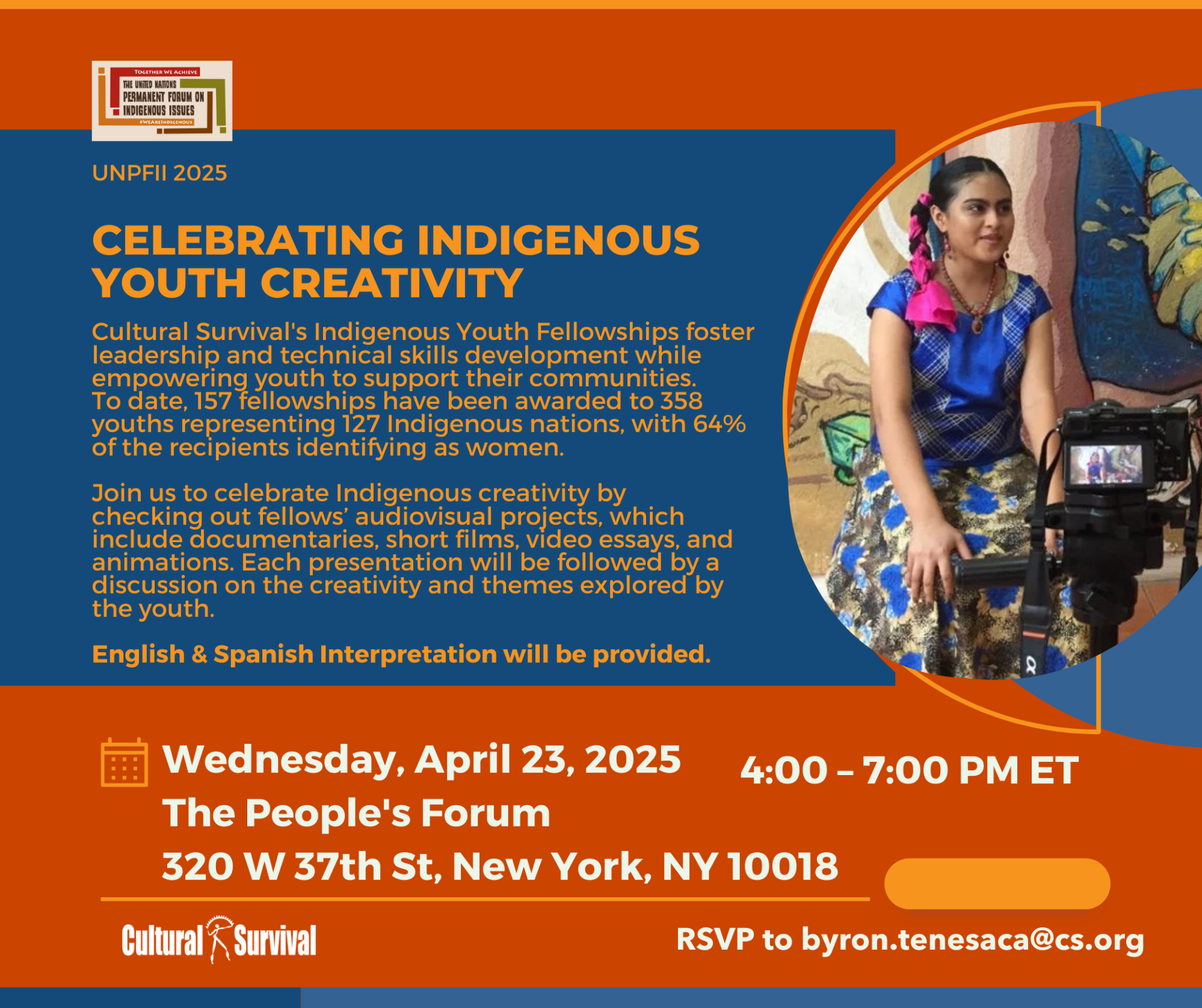
Wednesday, April 23, 2025 ⋅ 4:00 – 6:00 pm ET
The People's Forum, 320 W 37th St, New York, NY 10018
Celebrating Indigenous Youth Creativity
Cultural Survival's Indigenous Youth Fellowship Program, established in 2018, has provided financial support ranging from $2,500 to $6,000 to individuals and groups of young people. These fellowships foster leadership and technical skills development while empowering them to support their communities. The program focuses on key areas such as Indigenous rights, language and cultural revitalization, Traditional Knowledge, and audiovisual communication. Participants receive personalized mentorship from Cultural Survival staff throughout their projects. To date, 157 fellowships have been awarded to 358 youths representing 127 Indigenous nations, with 64% of the recipients identifying as women.
This event will highlight the audiovisual projects (examples include documentaries, short films, video essays, and animations) created by our past fellows. Each presentation will be followed by a discussion on the creativity and themes explored by the youth. This event intends to elevate the messages in each project and celebrate the work of our past fellows.
RSVP at https://forms.gle/
English & Spanish Interpretation will be provided. Se proporcionará interpretación en inglés y español.
Organizer: Cultural Survival
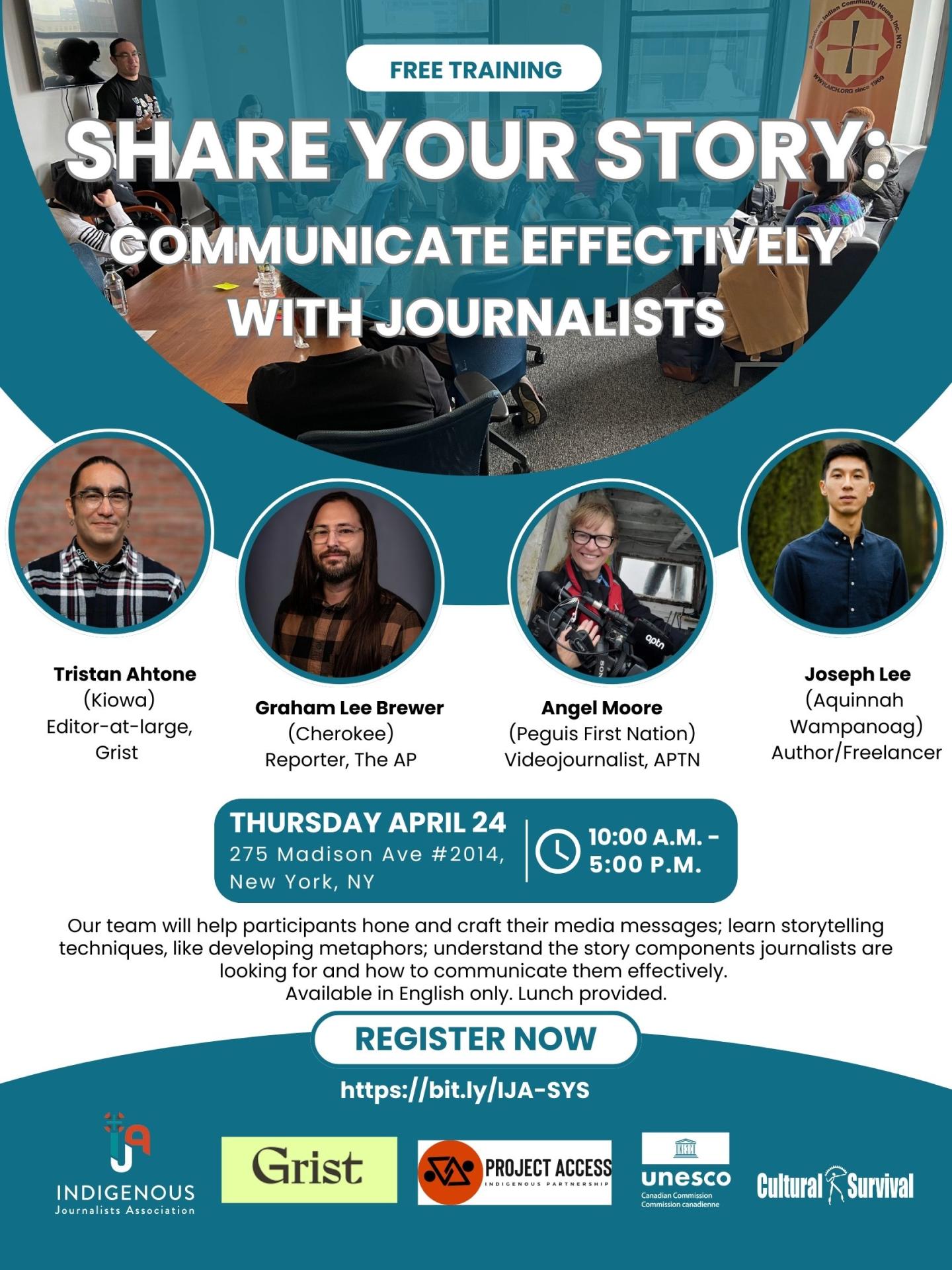
Thursday, April 24, 2025, 10 a.m. - 5 p.m. ET
Share Your Story: Communicate effectively with journalists training
American Indian Community House
275 Madison Ave #2014
New York, NY
Indigenous leaders and grassroots organizers have important stories to tell, but many are not accustomed to working with journalists and media. This contributes to Indigenous Peoples' affairs, and the UN Permanent Forum on Indigenous Issues (UNPFII) not getting the media attention they deserve. To address this gap, IJA and Grist co-produce a media training program for Indigenous leaders. During the training participants will learn how to hone and craft their messages; learn storytelling techniques and tools, and understand the story components journalists want and how to communicate them effectively to journalists and media.
Share Your Story has trained 34 community members from around the world. This program is supported by CCUNESCO, Cultural Survival and Project Access Indigenous Partnership.
Register here: https://forms.gle/
For questions, please contact fcompton@naja.com.
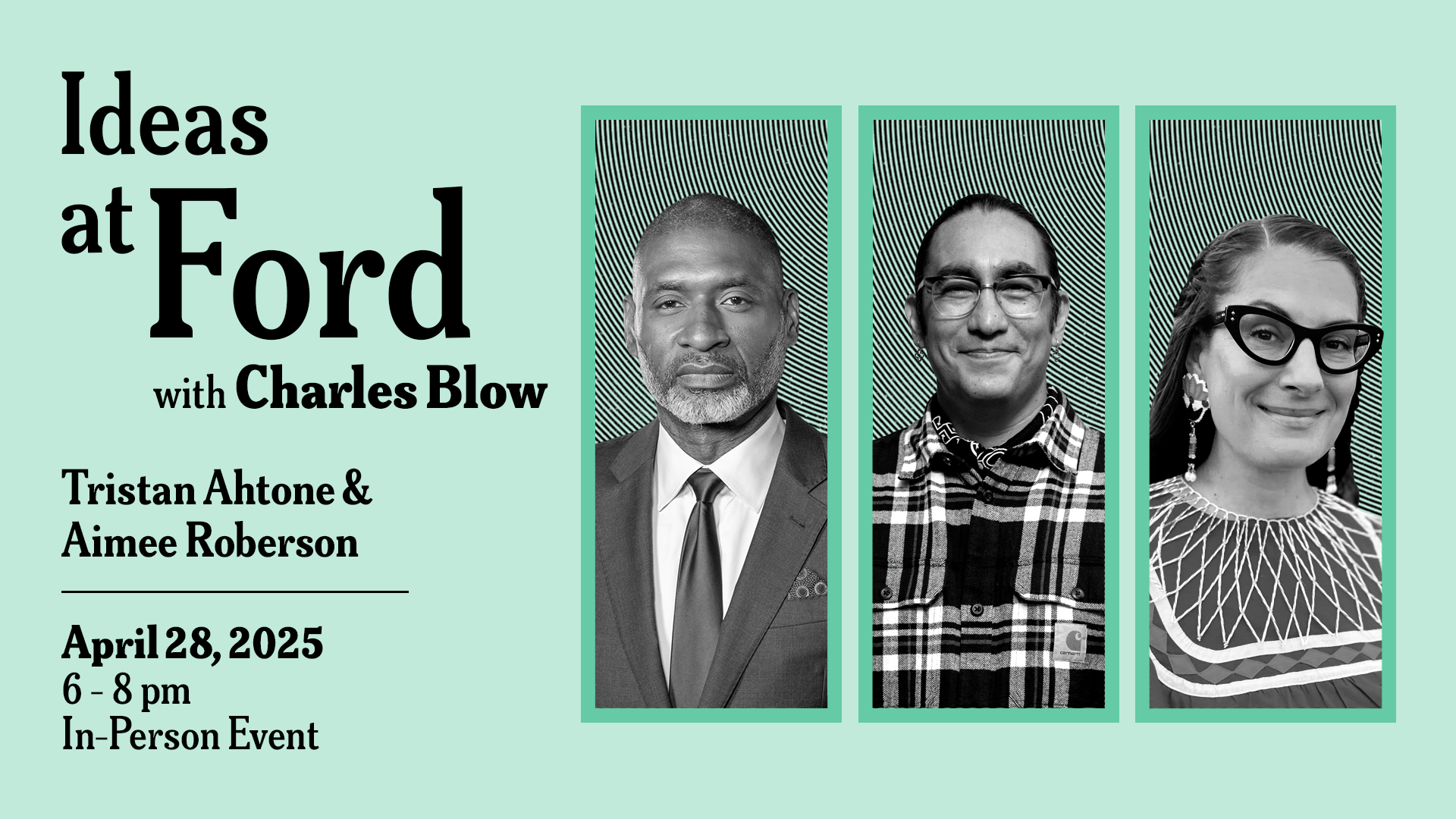
Monday, April 28, 2025 6:00 p.m. - 8:00 p.m. ET
Ford Foundation, Center for Social Justice
320 East 43rd Street, New York, NY 10017
Ideas at Ford: Centering Indigenous Voices in the Climate Movement
Climate change is one of the most pressing issues of our time, but if we fail to listen to those closest to the issue, how can we expect to find a lasting solutions?
Join us as we sit down with Indigenous leaders who are placing their communities' voices at the heart of the climate conversation.
Speakers:
- Tristan Ahtone (Kiowa), Editor at Large at Grist
- Aimee Roberson (Choctaw and Chickasaw), Executive Director at Cultural Survival
| Registration is required for all guests, and RSVPs are non-transferable. When entering the details of your name, please include the information as it appears on your photo ID. |
